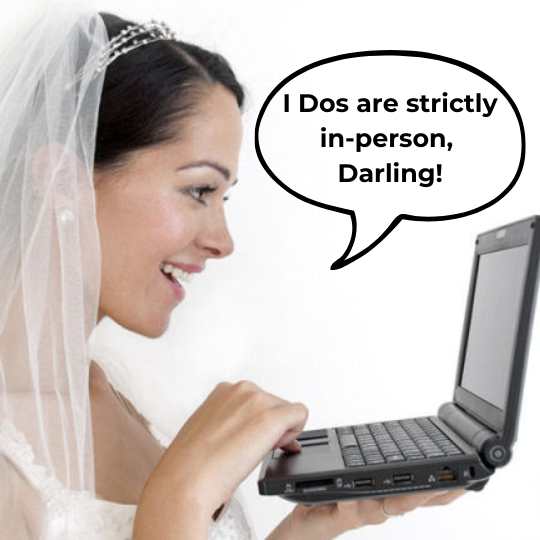Getting Married via Skype - Possible in Australia or Not?

If there is one thing that will keep us together at this time (March 2020) when we are being begged to self-isolate and stay home as far as possible, it is the fantastic technology we all have access to in our pockets and purses and on our desks.
So, knowing that we all have the capacity to Skype, FaceTime, use Google Hangouts or other videoconferencing technology, it is logical that couples who have had their wedding plans disrupted by government restrictions on travel and on venues, and who have seen ceremonies live-streamed in one way or another, to start asking whether they can have a legal webcam wedding, either because they are physically separated from one another, or from their witnesses, or from their celebrant.
So, is it legal? Sorry,
NO, it is not legal in Australia
other videoconferencing technology, or by proxy.
Legal marriage in Australia is governed by the Marriage Act. During that ceremony, and before you make your vows, I, as your celebrant have to recite a statement that includes the following words
" ... Before you are joined together in marriage in my presence and in the presence of these witnesses ..."The operative word is presence. You can't get married if you, your partner, or any of five people who make up the minimum numbers that have to be present at a wedding are not be in the same physical space. The internet is not recognised as a legal entity, or as a place.
Current social distancing requirements requires that, to allow for the minimum of five people who must be present, the physical space for an indoor wedding must be a minimum of 20 square metres in size and each person should be at least 1.5 metres apart from the others.
Why the confusion?
out
There are still some places on the planet
where proxy weddings are legal, usually under very
specific conditions. A proxy wedding is where one
of the marrying parties isn't present and is
represented by someone else. It is generally
restricted to persons serving in the military and
deployed. Australia does not allow proxy
marriages. Full stop.And in others, courts have ruled that international couples will be able to marry over the Internet, through video conference programs like Skype or Google Hangouts, so long as this is also allowed in the nation state of the foreign spouse, since it suitably allows for both spouses to express their consent.
But because it is not always clear where information is coming from. Where a website is hosted, or where a person posting on social media is located, it is quite understandable if you've happened on information that suggests you can get married over Skype, FaceTime, or other video conferencing platform.
But can you have virtual
participation at a legal wedding?
out
Of course you can. As long as the minimum five
people (the two of you, your two witnesses, and
your celebrant) are present in the same space,
your guests can be scattered around the world.Some practical
considerations
out
Many venues do have facilities to livestream
event, but current restrictions may mean that
most, if not all, will not be available to you, so
you would need to hire the services of an expert,
or do the best you can with technology available
to you to set up a DIY connection.Things you need to know or have in place in order to make sure you will have the best results possible on the day:
- Timing
How many time zones will be involved? And what will be the local time in those time zones at the time you've decided to hold the ceremony?
- Connectivity
How reliable and consistent is the connectivity where you are planning to hold the ceremony? Is the signal strong enough?
- Compatibility
Does everyone you want to livestream to have the required technology? Do they know how to use it? And do they all have the same application? - Scalability
How many devices will you need to establish a connection with? Some applications can support more than others. - Making sure it works
- Have a trial run a few days before at the same time you plan to hold your ceremony
- Have someone present whose only job is to
coordinate the technology
- Check out the light - if outdoors, where
will the sun be? If indoors, will the couple
be illuminated enough?
- Muting the guests
So as not to disrupt the ceremony, mute any guests who don't have a direct role in it. Make sure that the sound is turned back on immediately afterwards so your guests can congratulate you. - Plan B
Technology fails. That's a given. So a backup plan is very important should the internet connection fail, or your device runs out of battery power, or the person who was going to coordinate, does not turn up. - Video the ceremony
Worst comes to worst, you can send a video afterwards.
And Don't Forget
out
- a
- a

Things